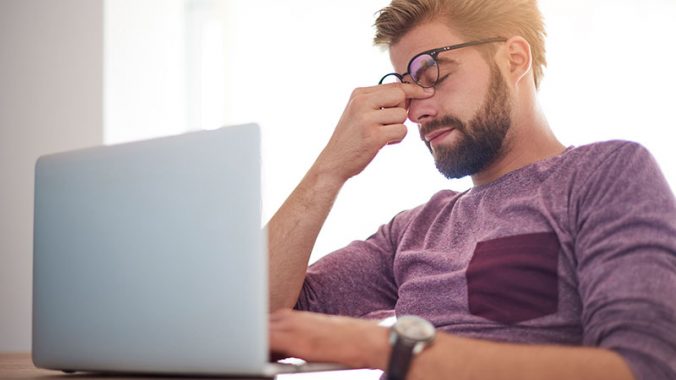We’re talking about micro–stresses, the term used to describe the things that rile us up without being considered big, life-changing moments. Think losing your keys, *just* missing the train, or running late for work.
Basically, daily micro-stresses impact you more than the big stresses you expect to be difficult, such as the death of a spouse, divorce, or serious injury (all in the top ten of the SRRS).
Researchers Allen D. Kanner, James C. Coyne, Catherine Schaefer and Richard S. Lazarus reckoned this is down to not simply the frequency of micro-stresses versus big stresses, but how micro-stresses make us judge ourselves. When you experience a big, stressful live event, you’ll seek out support and look after yourself.
But when you lose your keys, you’re late, or your relationship is irritating, you beat yourself up. When we experience micro-stresses, we’re likely to judge ourselves harshly – we’re clumsy, we’re forgetful, we’re too blame.
This is because daily micro-stresses suggest we’re either doing something wrong in our daily lives, or we’re unable to cope (which makes us feel like we’re failing). The more we add personal significance to a micro-stress, the more of an impact it has.
So if we respond to a shoe breaking on a walk to work by viewing it as a personal failing (we’re inept, we have rubbish taste in shoes, we made a bad investment), those negative feelings can add up and have an impact on the way we see ourselves, putting a dent in our mental health.
Subsequent research has found that our experience of each hassle influences our later coping habits, and that if we don’t adapt, the impact of those same micro-stresses comes back harder. Think about it. The first time you lose your keys is stressful, sure.
But if you keep losing your keys, you’re going to be even more critical of yourself, asking why you’re still unable to keep hold of something important. So we know micro-stresses have an impact. What can we do about them? First, we need to appreciate the significance of micro-stresses, and consider them as important factors in our mental health.
It helps to keep track of the micro-stresses you encounter throughout the day to see the scale of the problem, making a note every time you find yourself irritated, worried, or panicked. Once you’ve worked out which daily hassles are causing you moments of stress, dedicate some time to figuring out which ones are avoidable, and which ones are causing you genuine stress.
A survey and found that 58 percent of all Americans say they’re more stressed now than they’ve ever been.
“About one third of stress is caused by the accumulation, or snowballing effect, of everyday micro-stressors such as being stuck in traffic and waiting for appointments,” the survey reports. “Approximately half (49 percent) of Americans feel they don’t deal with stress well, and 67 percent would like more ways of dealing with their stress.” For this week’s Healthy Habit, I went in search of just that: ways to tackle life’s micro-stressors.
Try Myofascial Release
This type of physical therapy – conducted by professionals such as sports-medicine experts, massage therapists, and chiropractors – involves intense pressure on an area, followed by letting the muscles and fascia “release.” A study on the technique, which used blood cortisol levels to gauge reponse, found it more effective at reducing physical stress than taking a nap. You can also learn to do self-myofascial release at home, using foam rollers or tennis balls.
Commute Through Nature
Heading through a natural environment leads to better mental health, reports a 2018 study by the Barcelona Institute for Global Health. See if you can re-route your daily route so that you’ll pass through a park, under a canopy of trees, or past a nature reserve or forest. Even better: Bike or walk if you can.
Push Delete on Tech Stress
Some of the biggest stressors reported in the Enoteca survey involved tech, such as slow WIFI, forgotten passwords, or a phone battery dying. On the slow Wi-Fi – 33, call in a tech. In fact, you can call in a pro from a company like HelloTech for just about anything, from mounting a TV to setting up a smart doorbell to ridding a computer from a virus. For the cell phone battery, invest in a power bank so you can relax when the power starts to wane.
Chill Out: CBD, Sex, Sleep
According to Enoteca’s survey, the most common way of dealing with stress was by sleeping (41 percent), confronting issues head-on (36 percent), and exercise (33 percent), while almost one in 10 opt to use CBD products for relief. Enoteca is a company that makes CBD products. For more on CBD, see our story on CBD Oil for Insomnia.
A few more ideas:
- Cuddle or Have Sex. Both boost chemicals in the body, like oxytocin, which reduce stress and boost mood, report researchers from the University of North Carolina and the University of Pittsburgh. Sex also flexes the pelvis, which is key for stress release (see our article “What’s Hiding In Your Hips?” about the psoas muscles.)
- Sleeping is vital but can be challenging if you’re stressed; Johns Hopkins Medicine recommends doing progressive relaxation of the muscles each night before turning off the light, rather than watching TV.
Take Stress Seriously
In the report on the survey, the CEO of Endoca, Henry Vincenty, stated, “Stress isn’t an abstract issue – it’s a significant problem and doesn’t necessarily have to be caused by one large inciting incident.”

Leave a Reply
You must be logged in to post a comment.